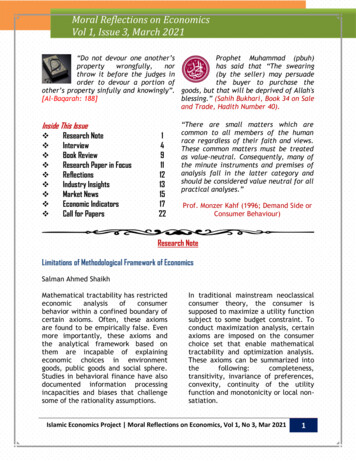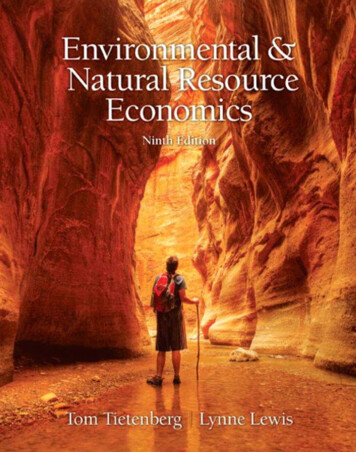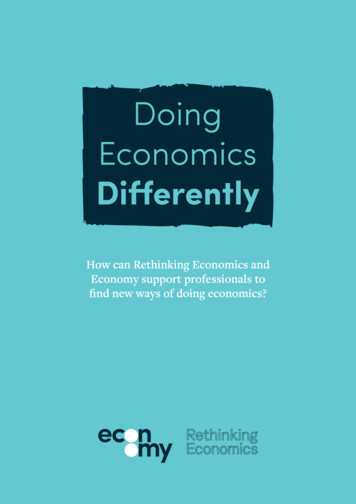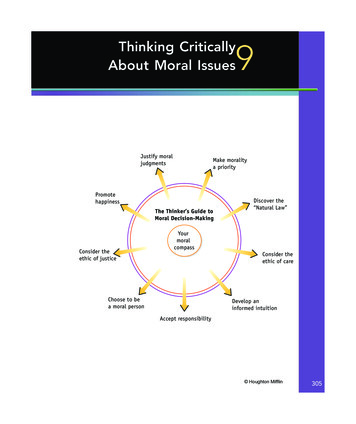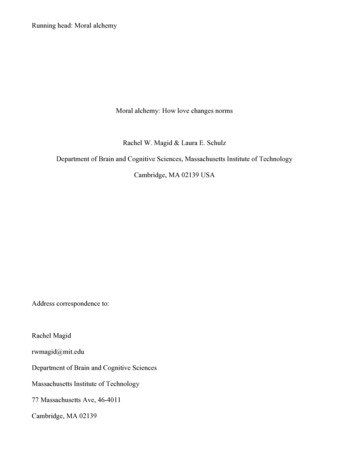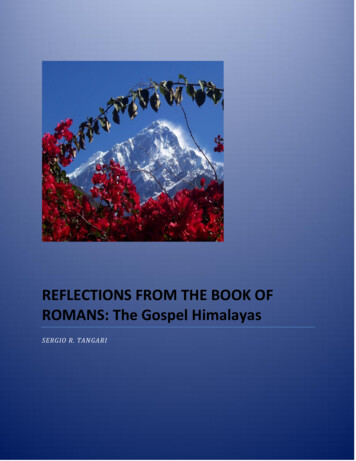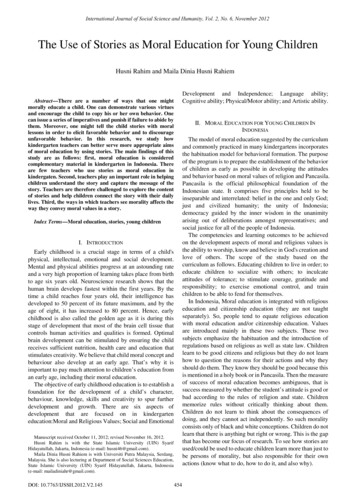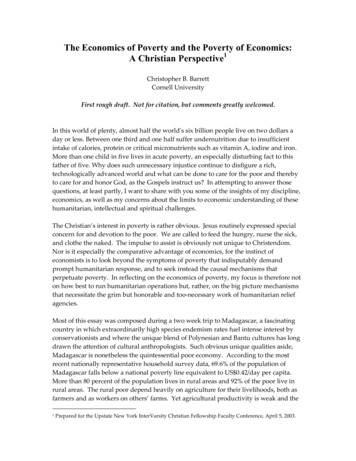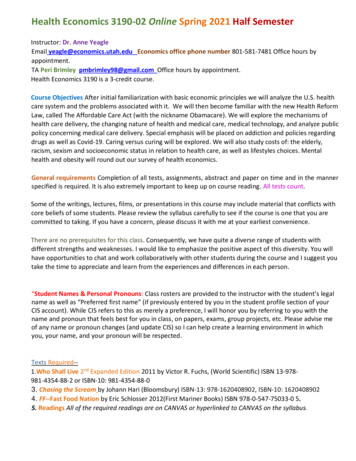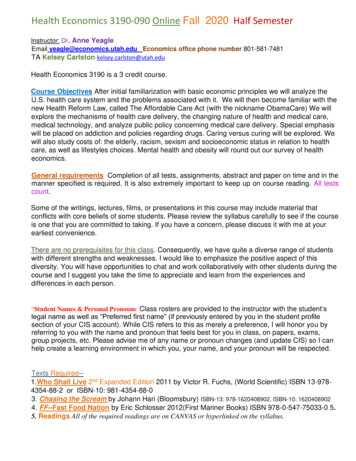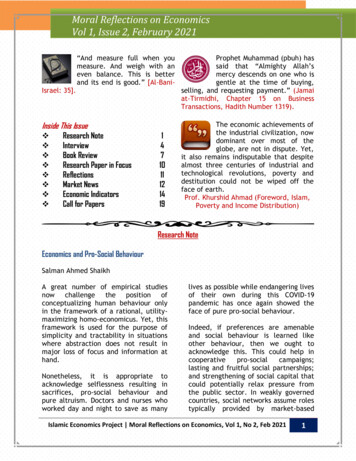
Transcription
Moral Reflections on EconomicsVol 1, Issue 2, February 2021“And measure full when youmeasure. And weigh with aneven balance. This is betterand its end is good.” [Al-BaniIsrael: 35].Inside This Issue Research NoteInterviewBook ReviewResearch Paper in FocusReflectionsMarket NewsEconomic IndicatorsCall for Papers1471011121419Prophet Muhammad (pbuh) hassaid that “Almighty Allah’smercy descends on one who isgentle at the time of buying,selling, and requesting payment.” (Jamaiat-Tirmidhi, Chapter 15 on BusinessTransactions, Hadith Number 1319).The economic achievements ofthe industrial civilization, nowdominant over most of theglobe, are not in dispute. Yet,it also remains indisputable that despitealmost three centuries of industrial andtechnological revolutions, poverty anddestitution could not be wiped off theface of earth.Prof. Khurshid Ahmad (Foreword, Islam,Poverty and Income Distribution)Research NoteEconomics and Pro-Social BehaviourSalman Ahmed ShaikhA great number of empirical studiesnow challenge the position ofconceptualizing human behaviour onlyin the framework of a rational, utilitymaximizing homo-economicus. Yet, thisframework is used for the purpose ofsimplicity and tractability in situationswhere abstraction does not result inmajor loss of focus and information athand.Nonetheless, it is appropriate toacknowledge selflessness resulting insacrifices, pro-social behaviour andpure altruism. Doctors and nurses whoworked day and night to save as manylives as possible while endangering livesof their own during this COVID-19pandemic has once again showed theface of pure pro-social behaviour.Indeed, if preferences are amenableand social behaviour is learned likeother behaviour, then we ought toacknowledge this. This could help incooperativepro-socialcampaigns;lasting and fruitful social partnerships;and strengthening of social capital thatcould potentially relax pressure fromthe public sector. In weakly governedcountries, social networks assume rolestypically provided by market-basedIslamic Economics Project Moral Reflections on Economics, Vol 1, No 2, Feb 20211
financial intermediaries or the sedifferences,experiences, success stories andalternate visions of policy, broadensthe perspective and enriches thesolutions toolbox to meet sustainabledevelopment challenges which requirestrong mutual understanding andefforts of diverse cultures towards acommon vision of future.The causal mechanisms through whichculture and institutions shape andconstrainhumanagentsremainunexplored in neoclassical economics.It is worthwhile to be cognizant of therole of cultural factors, social normsand spiritual stimuli in analyzing andtheorizing economic behaviour.For instance, if one is inspired byConfucian’s thoughts, it may affectone’s outlook about work andconsumption habits. In East Asia,individuals tend to work harder andlonger and have greater labor forceparticipation rates. As per the LifecycleConsumptionHypothesis,higherpropensity to save depends on theproportion of working age people in asociety. From growth theory, we knowthat savings is the most crucial variableaffecting growth, along with othermacro and institutional variables. Thus,remaining cognizant of the effects ofvalues, cultures and norms will helpavoid missing the crucial determinantsof a seemingly economic phenomenon.Values and norms can be positivelyutilized in achieving development goalswhere commercial interests are notgood stimulators. According to TheHunger Project, 2.4 billion people donot have adequate sanitation, andevery day, nearly 1,000 children diedue to preventable water andsanitation-related diarrheal diseases.This is partly because sanitation is notgood business as compared to cellularservices and life’s other comforts andluxuries. Interestingly, according to the2015 report of Food and AgricultureOrganization, globally, per capita foodsupply increased from about 2,200 kcalper day in the early 1960s to more than2,903 kcal per day by 2014. Thus,redistribution of resources is vital toenhance income as well as the capacityto earn sustainable incomes.The causal mechanisms throughwhich culture and institutionsshape and constrain humanagents remain unexplored inneoclassical economics.It isworthwhile to be cognizant ofthe role of cultural factors,social norms and spiritualstimuliinanalyzingandtheorizing economic behaviour.This requires income support programs,basic health and education as well asmicrofinance to build small enterprises.Overreliance on Pareto efficiencyparalyses equity and ethical concernsofdevelopmentpolicychange.According to Pareto efficiency, anunequal or equal distribution ofresources is equally efficient if no onecan be made better off without makinganyone else worse off.Sustainable development goals haveassumed poverty, hunger and inequalityasimportantgoals.However,economics education by and largeoutsources the realization of theseIslamic Economics Project Moral Reflections on Economics, Vol 1, No 2, Feb 20212
goals to development agencies andgovernments. If aid is inefficient asargued by Nobel Laureate AngusDeaton, then the neoclassical toolbox isvirtually empty. In a society wherepeople regard ending hunger as theultimate value to prioritize, then wecan end hunger when the aggregatesum of endowments equals what isneeded to feed everyone. Else, if weregard consumer sovereignty as theultimate value to prioritize, like we dotoday, then no wonder we are settinggoals for ending hunger by 2030 despitea global food surplus.people to transform these traits intopro-social actions. Thus, leisure isbetter understood as non-market savingof labor hours which can be spent onself-entertainment as well as onvolunteering.Likewise, philanthropy should not beenvisioned in the framework ofreciprocity alone. It is not necessarythatpeopledis-savelifetimeendowments on self-consumption; theycan leave philanthropic bequests andendowments, and are not necessarilyfollowing reciprocity in such actions.Rather, they may have a strong desireand willingness to help others evenwhen not reciprocated.In economics education and discourse,it must be noted thatexpenditure can be onIf we regard consumerself-consumptionasThere are countlesswell as on consumptionexamples of peoplesovereignty as the ultimateof others includinglike Mother Teresa andvalue to prioritize, like we dodependents,familyAbdul Sattar Edhi whotoday, then no wonder we aremembers, neighbors,lived their whole livespeople in inner socialservinghumanity.setting goals for ending hungercircle and society inExternalitiesbetweenby 2030 despite a global foodgeneral.Ifanutility functions cansurplus.individualprioritizescreate envy as well ascertain ethical goals,compassion.Humanse.g., contributing money and time inhave the potential to be envious as wellsocial causes over self-aggrandizement,as compassionate. Even as neutralthen theorizing should not assume itobservers of the positive phenomenon,away.we should acknowledge supportingevidence that people help strangers,Furthermore,leisureshouldnotpay anonymously in charities, andnecessarily imply ‘non-work’. Peoplesacrifice their wealth and even theircan choose to donate more time inlives in the pursuit of being a goodresponse to increase in wages sinceperson.they may have a desire and inclinationto help others. Situations often enableIslamic Economics Project Moral Reflections on Economics, Vol 1, No 2, Feb 20213
In Conversation with Thought Leaders in Islamic EconomicsDr. Muhammad Omar Farooq did his PhD from Universityof Tennessee and M.A. in Applied Economics from UCFCollege of Business. He had been associated withUniversity of California as Post-Doctoral Fellow. Heworked as Assistant Professor of Economics at WesternIllinois University and later as Associate Professor ofEconomics and Finance at Iowa Wesleyan College. For along time, he also worked as Associate Professor ofEconomics and Finance at Upper Iowa University.Currently, Dr. Farooq is an Associate Professor with theDepartment of Economics and Finance at University of Bahrain. He is anaccomplished economist with special interest, background and expertise ineconomic development, financial markets and institutions, including from Islamicperspective. He was featured among the 500 most influential people who makethe Islamic economy (190th rank in 2018). He has authored several publicationsin the form of research papers, book chapters and complete books. He is alsoauthor of the book ‘Toward Our Reformation: From Legalism to Value-orientedIslamic Law and Jurisprudence’. He is an accomplished educator, an activeresearcher, an engaging public speaker, an effective trainer, a prolific author onmyriad of issues, and a contributor to critical/creative thinking and mindbuilding. His current interests and focus include Islamic law and jurisprudenceand making Islamic economics and finance relevant to real world issuespertaining to poverty and development. We got an opportunity to get his insightson Islamic economics and finance and hope that these insights will introduce newways of thinking for young economists and social scientists aspiring to contributein this field.Q.1: You were trained as amainstreameconomistintopuniversities of USA. What inspired youto become researcher in Islamiceconomics?Three things. First, as I advanced in mycareer as an academic economist anddeveloped a better understanding ofthe field, I found it significantlydelinked from thereality andparticularly weak in terms of atheoretical edifice that is based onmanyunrealisticanduntenableassumptions. This led me to take amore critical approach to economics ingeneral, especially as e potential of humanbeings.Second, I came to the realization thatthere is too narrow a disciplinaryapproach to economics, while we couldbenefit more from an interdisciplinaryapproach, drawing on several relatedsocial sciences and even beyond.Third, as a Muslim I am convinced thatthere are some key Qur’anic guidancerelated to our life’s economic andfinancial dimensions and those aremeant to be good not just for Muslims,but also for the humanity at large.Islamic Economics Project Moral Reflections on Economics, Vol 1, No 2, Feb 20214
Q.2: In your writings, you had showndiscomfort with Mathematization ofeconomics. At the same time, you hadalso urged economists working inIslamic economics to develop the fieldanalytically. What makes you thinkthat Islamic economics has merit tobe a distinct and analytical fieldfollowing the incomplete success ofDSGE models to comprehend openanddynamiceconomywithheterogeneous agents making choicesunder uncertainty in imperfectmarkets?elegance, precision and internalconsistency of various models is not.So, Islamic economics can become ananalyticalfieldbyincorporatingmathematics for clear articulation ofcomplex interrelationships and pursuingempirical questions, but it shall avoidMathematization merely for the sake ofelegance and conformity with currentnorm of articulation of thoughts ineconomics.Q.3: As we deal with Post COVID-19recovery, what effective role Islamiceconomics through its principles andinstitutions could play in youropinion?I think the idea of Mathematization ofeconomicshastobeproperlyunderstood. Mathematics is a vital toolI am afraid that despite its potential,of human knowledge and it can andIslamic economics is not properlyshould be applied as relevant anddeveloped or positioned yet to haveappropriate. The same is true aboutany systemic impact, especially in aeconomics. However, consider the factcrisis context. It is important tothattheearlierrecognize that Islamicgenerationofeconomics cannot be aMathematics, where neededeconomists and evendiscipline isolated fromandusefultoilluminateourlater on John Maynardthe economy in theKeynes’ contributionscontext of the realunderstanding of the realwere more akin toworldpoliticsandeconomy, is desirable, while“political economy”.governance.Also,Mathematization in pursuit ofIslamiceconomicsmerely elegance, precision andGradually, in pursuit ofcannot be merely atheprecisionofmicro-enterprise.internal consistency of variousimaginary models, outbeingbehavior both at theanchored in a countryindividual and collective level was lost.or society’s robust, coherent and moralThat’s why much of the modernframework of national development,conventional economics is unable tomight not be quite capable ofpredict, explain and solve the recurrentdelivering what is often expected of it.problems of the real world.To appreciate the challenge, one needsto identify what Islamic economics hasMathematics, where needed and usefuldone before the COVID-19 in a normalto illuminate our understanding of theenvironment to be able to determinereal economy, is desirable, whilewhat it might be able to offer in aMathematization in pursuit of merelypandemic-induced crisis, unless IslamicIslamic Economics Project Moral Reflections on Economics, Vol 1, No 2, Feb 20215
economics is reduced primarily toZakat, Sadaqa and other charitableinstruments. I invite the readers toperuse a relevant paper of mine: “TheChallenge of Poverty and the Poverty ofIslamic Economics.”Q.4:Bangladeshhasachievedtremendous success in the design andpenetration of microfinance. Whatcritical elements can be learned fromthe experience of microfinance inBangladeshtodevelopIslamicmicrofinance sector in Asia andbeyond?of the services in a well-planned, wellsupervised framework to serve targetedgroups. In this regard, Islamicmicrofinance should not be merelytaking the conventional microfinanceand fit it into Shari’ah compliantcontracts. While learning from both thepositive and negative experience ofconventional microfinance, Islamicmicrofinance needs to be moreinnovative and more humanly-sensitiveto the problems that microfinancegenerally tries to address.Q.5: How do you see Islamic financeand Islamic capital markets in 2021 asThat’s true, but partially. One needs tomost economies are expected to postrecognize that the emergence andpositive growth rate and vaccinationintroductionofat mass scale mayContracts themselves do notmicrofinance camekeep spread underabout primarily duecontrol?have any magic; the realto the public sectoroutcome is more dependentfailureofmanyI am quite positiveon the design and delivery ofemerging,lessabout it. More growththeservicesinawell-planned,developed urbulentwell-supervised framework toaddresstheiryearfollowingtheserve targeted groups.fundamentaloutbreak of COVID-19.economic problems.That reality still remains. MicrofinanceQ.6: What in your view are theis no more than resources that are foroutstanding and unresolved questionstargeted intervention in a supervisedin the field of Islamic economicsframework.which need attention of economistsworking in Islamic economics?There is a lot to learn from thecontributions of institutions likeUnfortunately, there is no simpleGrameenBankandanti-povertyanswer to this question. In my humbleinitiatives.Unfortunately,theview, in developing Islamic finance ineffectiveness of such initiatives cannotthe way it has happened, without itbe measured merely in terms ofbeing anchored in an economy based onShari’ah compliance of the relevantIslamic values, norms and parameters,contracts.current Islamic finance is like puttingthe cart before the horse. I haveContracts themselves do not have anyarticulated my thoughts in this regardmagic; the real outcome is morein a paper “Islamic Finance Eclipsingdependent on the design and deliveryIslamicEconomics:CausesandIslamic Economics Project Moral Reflections on Economics, Vol 1, No 2, Feb 20216
Consequences”. Also in my view, oureffort should not be concentrated toomuch on the theoretical edifice inabstract; rather, we should identifywhat our fundamental economicproblems and challenges are and howour theoretical and empirical works canhelp us effectively address thoseproblems and challenges. Our currentliterature on Islamic economics seemsto fall short on that practical side.Q.7: What is your advice to aspiringresearchers in the field of Islamiceconomics and finance?It is still a rather new field that wemust continue to nurture. During thetwentieth century, the revivalist effortsaspired to bring back Islam in our lifecomprehensively, including in theeconomic dimension of our life.However, for various reasons, Islamicfinance became dominant pushingIslamic economics in the background.To be able to deliver what is expectedof it, Islamic finance needs to beanchored in an Islamic economicframework. Our pursuit of an Islamiceconomy, in my view, should bepractical and problem-solving oriented.I hope that aspiring researchers in thefield would not feel constrained by thedevelopments in this field to date andapproach the field afresh if needed. Wecan benefit from the current shelf ofknowledge and experience, but mustnot feel constrained by it.Book ReviewTitle:Islam, Poverty and Income DistributionAuthor:Prof. Dr. Ziauddin AhmadPublisher:The Islamic FoundationIn this book, the author emphasizesthat the approach to tackle poverty inIslamic economics framework employsmultiple institutions. Islamic principlesurge voluntary charitable behaviour.While Zakat is fractional distribution ofsome wealth and income, laws ofinheritance in Islamic economicsredistribute the whole of wealthincluding assets in personal use to awidearrayofrelations.Thisredistribution happens for each personin every family. This one-to-many nonmarketbased,butwholesomedistribution of wealth owned by everysinglepersonachievestheredistribution objective. Explaining thedistinctive feature of Islamic laws ofIslamic Economics Project Moral Reflections on Economics, Vol 1, No 2, Feb 20217
inheritance distribution, the notedauthor writes: “as compared toinheritance laws and customs prevalentin many other societies, it leads towider intergenerational dispersal ofaccumulated wealth”.opportunity for labour to participate inthe fruits of economic enterprisedirectly and proportionately. Returns torentable factors of production aremarket based and productivity based.They facilitate asset ownership, but donot make it compulsory. In contrast,borrowing money on interest makes itcompulsory to repay interest as well asprincipal without any reference andaccounting of the productive outcomeof the economic enterprise for whichthat loan was taken.On targeted distribution embedded inthe institution of Zakat, the authorwrites: “Since the incidence of Zakah ison relatively well-off sections of thepopulation and the proceeds have to bespent primarily for eradication ofpoverty so long as poverty exists, itserves a redistributive purpose”. TheIn interest based financial capitalism,author notes that as an incomeneed based and commercial loans aremaintenance scheme, it reduces thepriced the same way on the premise ofincomedifferentialpre-supposedbetween the rich andopportunity cost toWhile Zakat is fractionalthe poor. If Zakat isserve the wishes ofdistribution of some wealthdistributed in the formcapitalists.Islamicand income, laws ofof productive assets, itprinciplesencourageprovidesassetvoluntary philanthropyinheritance in Islamicownershipthator interest free loanseconomics redistribute theenhances consumptionto serve the needs ofwhole of wealth includingnot only in the shortsociety. If a personassetsinpersonalusetoarun, but also in thewants to earn returnlong run.wide array of relations.on investment, it ismade compulsory toOn the other hand, Islamic prohibitioninvest in productive assets and then toof interest avoids any privilege andsell or lease them to earn profit onfactor return to money capital unless ittrade or rent on lease. Else, the personis converted into real and productiveshallprovideinvestmentasasset or participates in the productionentrepreneurial capital, i.e. as equityprocess as entrepreneurial capital. Thisstake in a productive business.takes away the privilege capital has inthe system of capitalism where theThe noted author also talks about theowner of money capital can simply lenddistinction in the role of markets andmoney for risk-free return in the formconsumer choice in the Islamicof interest.economic framework and capitalism. Incapitalism, it is abhorred to anchor andIn distributing income among theregulate consumer sovereignty andfactors, Islamic economic principlesmarket mechanism. Islamic economicemphasize just and timely wages to theframework provides the boundarylabour.Islamicequityfinancingconditions in terms of ethical principlesprincipleslikeMudarabahallowwhich are binding on both consumersIslamic Economics Project Moral Reflections on Economics, Vol 1, No 2, Feb 20218
and producers. Within the boundaryconditions of ethics, consumers andproducers exercise choice. But, ifdistributive justice and social welfaredemand, the government can interveneto anchor and regulate where necessarytoavoidexploitation,wealthconcentration, monopolization andinjustice.developed, but which have highincidence of poverty are unable todesign and apply social securitysystems. Rich are able to evade taxes,engage in capital flight and remainoutside regulation with regards to theirwealth.Islamiceconomicsframeworkemphasizes on rule of law for all andThe author also emphasizes that Islamicpursues eradication of poverty througheconomics framework does not suggesta targeted and focused approach.strict controls, central planning andThroughZakatandinheritanceloss of economic choice for thedistribution,itnecessitatesmembers of society. He writes: “Islamredistribution. Through prohibition ofdoes not rely on the agency of theinterest, it channels surplus wealth instate alone to bringproductive economicframeworkjustice. It seeks toencouraging voluntaryprovides the boundarycreateamongitscharity, it urges profollowers a strongsocial behaviour.conditions in terms ofsenseofsocialethical principles which areresponsibility for theThebookisanbinding on both consumerswelfare of the poorerexcellent introductionand producers. Within thesections of society. Ifto Islamic economicsIslamic teachings areand its approach toboundary conditions ofactedupon,tackle poverty andethics, consumers anddistributivejusticeincome inequalities. Itproducersexercisechoice.can be attained whilewas first publishedindividual liberties arearound 30 years backpreservedandregimentationiswhen Islamic Finance was only justavoided”.starting in very few countries. Thefocus in the literature was more onTheauthoralsoexplainstheachieving success in social goals likedistinctions in the social securityeradicating poverty, reducing incomesystem in Islamic economics frameworkinequalities and ensuring inclusive,and capitalist framework. The latter isegalitarian and equitable financial andfocused on insurance and socialeconomic system.welfare. In social welfare, a lot offunds are used up in infrastructure thanThe economics based explanation ofon eradicating poverty. InsuranceIslamic institutions has not movedfunded by payroll taxes covers upperfurther in terms of analytical depth.middle class more than the unemployedThe practice has been dominated bypoor people. It is also dependent onIslamic banking institutions which areeconomic growth and development.facing competitive pressures and haveCountrieswhicharelesswellIslamic Economics Project Moral Reflections on Economics, Vol 1, No 2, Feb 20219
to manage commercial displacementrisk.For different reasons in academia, theliterature has also focused more onempirical analysis of these institutions.There is a need to reassess economicand social performance of theinstitutions that have been establishedand developed and remodel andreorient them if necessary. It is vital toensure that the broader and visionarygoals through which distinction wasclaimed for the Islamic economicsframework are indeed achieved.Research Paper in FocusPaper Title: An Analysis of the Normative Parameters of Reward and Risk in IslamicFinanceAuthor:Mohamed BenaichaPublisher: ISRA International Journal of Islamic Finance, 2(3), 303 -323.This paper aims to define theparameters of the reward-risk principlein Islamic finance. The principle ofreward-risk stems from the Hadith ofAl-Kharāj bil-Damān (reward is justifiedthrough liability) (Source: Al-Tirmidhi,Chapter 15, Hadith No. 1286). Profitand loss sharing based investmentcontracts are embodiment of riskreward principle. In contrast, Ribā(interest) is prohibited because thelender is entitled to a guaranteedreturn above the principal and theguaranteed principal sum in full.One implication of the principle is thatif investment deposits are taken inIslamic banking on equity investmentbasis, then the bank cannot givedeposit insurance. If the deposits aretaken as Qard or as Amānah, then therepayment of the deposited amountcan be guaranteed.In the financing operations, the primarycontractual categories using Islamicbanking financing products are sale,lease and partnership contracts. Theauthor writes that reward-risk appliesslightly differently to each, but theforms of risk that apply are either oneor both of ownership and market risks.The author analyses the Islamicfinancing contracts to see whetherIslamic debt based financing productstake these risks meaningfully or not.While citing other scholars as well, hecautions that it is important to ensuremeaningful ownership and risk-taking.The author writes that risk must beborne by the financier, be it in theform of ownership risk of physicalassets or equity risk in the form of Māl(capital) invested into the venture of acustomer.Islamic Economics Project Moral Reflections on Economics, Vol 1, No 2, Feb 202110
The author elucidates that profit onMāl is justified if capital loss riskgenuinely exists. Profit on a loan isRibā, as there is no capital loss risk ona loan, i.e. it is guaranteed. In bothcases, capital is advanced as a form offinancing, but the distinguishing factoris the risk, which renders the profitlegitimate or not.From the investment perspective, therisk-reward or risk based rewardprinciple is quite compatible with thenotion of positive ex-ante relationbetween risk and return in modernportfolio theory. In developing assetpricing models for risky financial assetsin Islamic finance and evaluation ofinvestment portfolios, the standardtools can be employed with certainmodifications in the choice of risk freeasset (i.e. rate of return on Sukukrather than interest rate on treasurysecurities).However,fromtheeconomics standpoint, it is alsoimportant to have distinctive pricebenchmark and meaningful observanceof ownership and market risk to justifyrealistic distinction of Islamic finance.The paper is a good attempt toconceptualize the Fiqh basis of riskreward principle and to use theunderstanding in revisiting both Ribābased and Islamic finance contracts.ReflectionsIn resource economics, Hotelling's rulesuggests that owners of non-renewableresources will only produce a supply oftheir basic commodity if it can providea rate of return in excess of the rate ofreturnonfinancialinstruments.Hotelling's theory is used by economiststo attempt to predict the price of oiland other non-renewable resources,based on prevailing interest rates.For instance, if the natural resourceprice is expected to appreciate by 10%whereas the return on interest basedinvestment is 7%, then the naturalresource owner will not extract andwill wait. On the other hand, if thenatural resource price is expected toappreciate by 10% whereas the returnon interest based investment is 7%,then the natural resource owner willextract and sell the natural resourceand invest the proceeds in interestbased investments.Strikingly, it is ignored that naturalresource has intrinsic value. The valuein exchange is different from value interms of maintaining and sustainingecological balance. Water is highlyvaluable for life despite its very lowvalue in exchange due to abundantsupply at lower marginal costs.A natural resource with intrinsic valueshall not be compared with receipt oflittle more fiat currency. Fiat currencydoes not have intrinsic value. Even ifinvestments in crypto currencies yieldhigher return now in the short run, itwould be highly inadvisable toexchange them with non-renewableresources which have intrinsic value.Interest rates may go down to zero orIslamic Economics Project Moral Reflections on Economics, Vol 1, No 2, Feb 202111
even negative, but the extraction ofnon-renewableresourcesisirreversible.Money supply can be increased out ofthin air, but the non-renewableresources once exhausted cannot bebroughtback.Remarkably,theimportance of ecology is not learnteven after repeated unsuccessfulexpeditions in space to search ingandinformative book cannot be valued justby measuring the cost of pages,printing and binding.It is worth reflecting on what JohnMaynard Keynes wrote in his magnumopus ‘General Theory of Employment,Interest and Money’: “Interest todayrewards no genuine sacrifice, anymore than does the rent of land. Theowner of capital can obtain interestbecause capital is scarce, just as theowner of land can obtain rentbecause land is scarce. But whilstthere may be intrinsic reasons forthe scarcity of land, there are nointrinsic reasons for the scarcity ofcapital.”Market News S&P forecasts total Sukuk issuance of about 140 billion– 155 billion in 2021, ascompared with a drop in issuance to 139.8 billion in 2020 and from 167.3 billionin 2019 (Gulf News, Jan 17, 2021). Cagamas issued RM 300 million worth Islamic commercial papers (The Star, Jan 20,2021). Market research has indicated that more than 70% of Muslim Canadians wouldadopt Halal investing if products are available (Advisor’s Edge, Jan 21, 2021). Total Sukuk issuances worldwide set a new re
Islamic Economics Project Moral Reflections on Economics, Vol 1, No 2, Feb 2021 5 Q.2: In your writings, you had shown discomfort with Mathematization of economics. At the same time, you had also urged economists working in Islamic economics to develop the field analytically. What makes you t

